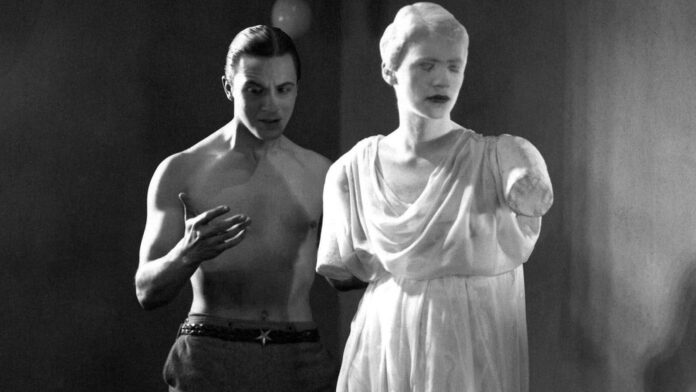The sudden announcement last week that Berkeley’s Shattuck Cinemas is closing—either Tue/24 or at month’s end, for reasons that are likewise a bit murky—provides yet another blow to Bay Area filmgoing. Particularly as the multiplex programmed both mainstream and arthouse releases, leaving precious few outlets remaining for the latter in the East Bay. Keep your fingers crossed for San Francisco’s own Opera Plaza screens, since the Landmark Theaters chain has now pulled plug on just about every other venue hereabouts.
Fortunately there are still a few alternatives available to Netflix, or Top Gun: Maverick, or other default mainstream entertainment options of the moment. The Roxie in particular is having an interesting week with several programs of note. This Wed/25 there’s a rare 16mm screening of Jean Cocteau’s 1932 The Blood of a Poet, the classic French avant-garde short feature which, alongside Bunuel’s L’age d’or, set an early high water mark for screen surrealism.
Its series of fantastical, sometimes cruel setpieces utilize cinematic tricks (slow-mo, animation, jump cuts, illusory perspectives, superimposition, reverse motion, negative imagery etc.) that may seem primitive and obvious now. But they had seldom been used for anything but comedy or Melies-style whimsy before, and even now retain the potency of their creator’s sensuous dream logic. Le sang d’une poete plays with another hugely influential experimental classic, Maya Deren’s 1943 short Meshes of the Afternoon.
The next night, Thurs/26, the Roxie is presenting a program in conjunction with Frameline and the GLBT Historical Society of two recently restored 1970s adult features by the late Arthur J. Bressan, Jr. Yes, these are gay porn—but even at the height of 1970s “porno chic,” arguably no one was making “skin flicks” as complex in artistic, political and genre-hybridizing reach as this native New Yorker, then living in San Francisco.
A particular delight to both the movies on hand is that they are such rich records of Me Decade SF: Passing Strangers (1974), about a gay couple who meet via personal ad, and Forbidden Letters (1979), about another pair reuniting after one partner’s jail stint, roam the city to cruise, sightsee, have sex at Land’s End, and document public community events like an early “Gay Freedom Day” parade and a drag Halloween ball.
Full of romantic longing (as well as frequent graphic sex), alternating between color and B&W, with eccentrically diverse musical backing and unconventional narrative structures, they are singular, poetic time capsules of post-Stonewall, pre-AIDS gay life. Bressan would himself make the first dramatic feature about AIDS (1985’s microbudgeted, non-porn Buddies, also recently restored) before succumbing to it himself in 1987, at age 44. Filmmaker and Bressan Project co-director Jenni Olson will introduce the program. (The films will also be available on DVD and Blu-Ray as of June 28, more info here.
A couple new releases:
The Tale of King Crab
Also at the Roxie, as of Fri/27, is this unusual and arresting first narrative feature from Italians Alessio Rigo de Righi and Matteo Zoppis. Framed as a legend told (and argued) among old men over wine in the present day, it begins in Pasolini/Taviani Bros. territory before veering off into Herzog-ian exotic adventure.
Sometime in the 19th century, doctor’s son Luciano (Gabriele Silli) seeks only to “live as I please,” a thinly tolerated if disgraced wanderer said to be crazy, or a drunkard, or both. When the local prince shuts his castle grounds’ gate to the peasantry, our dissolute hero is outraged, ultimately leading to an offense that gets him exiled. The film’s second part is a Treasure of Sierra Madre-like doomed quest for treasure in the forbidding Argentinian interior, where Luciano has adopted the garb (but probably not the vocation) of priest.
If its first half is about a man against society, King Crab’s second finds that man now flailing against God. This movie shot on striking locations in unusually rich, delicate color is at once bluntly realistic—the lives depicted being mostly poor, rough, and uneducated—and eccentrically parabolic. Feeling more like a lost European or Latin American film from the 1970s than anything of recent vintage, it’s the kind of very odd duck you don’t know quite what to make of at first, but whose beautiful strangeness is likely to haunt the memory.
Montana Story
More discordant emotions in splendid surroundings are offered by the eclectic directorial team of Scott McGehee and David Siegel (The Deep End, Bee Season, What Maisie Knew). The duo’s first feature in a decade is a rural drama reuniting estranged siblings under difficult circumstances. Their father in a coma, tended by home care nurse Ace (Gilbert Owuor), Cal (Owen Teague) and Erin (Haley Lu Richardson) reluctantly return to the Montana ranch they grew up in. They have not, in fact, had any contact with one another for years, since Erin ran away from serious abuse at the now-dying father’s hands. Needless to say, old wounds resurface.
As with several of McGehee and Siegel’s prior efforts, this one is a little too low-key for its own good—more thoughtful and well-crafted than moving or vivid. That’s a problem when the subject is something as emotionally painful as domestic abuse, which has certainly been treated with greater impact elsewhere than gets managed here. Nonetheless, the actors do their best, and the film’s earnest, talky nature is alleviated by the beauty of the surrounding landscapes in Montana’s Paradise Valley. Montana Story opens Fri/27 in Bay Area theaters including the Kabuki, Bay Street Emeryville, Albany Twin and Regency in San Rafael.






